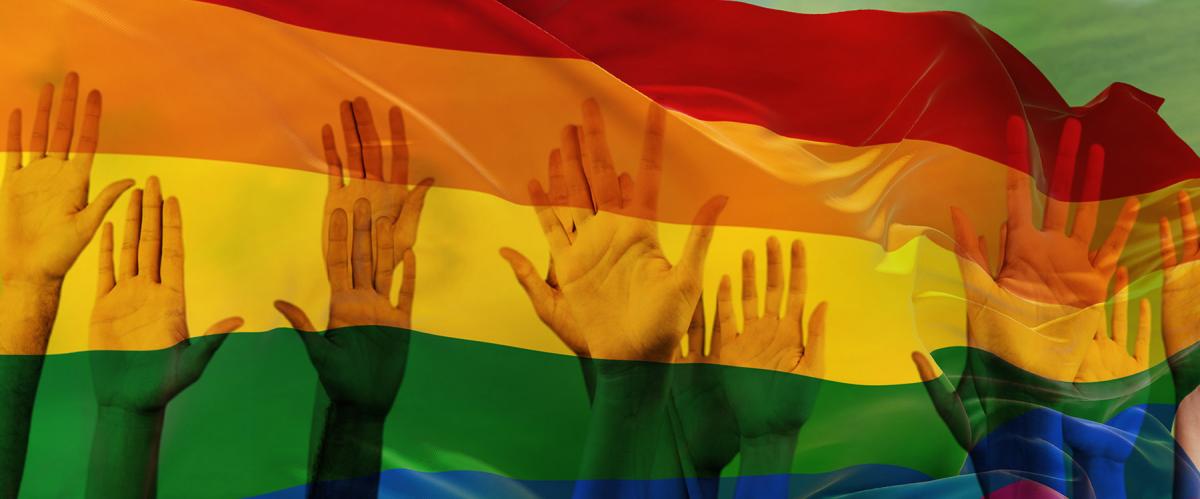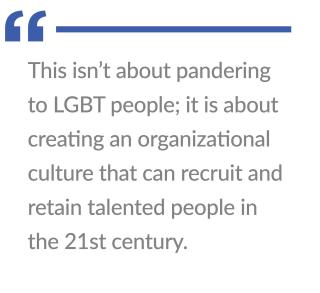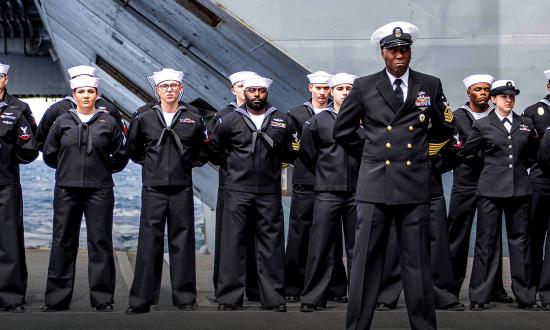Entering the Coast Guard Academy in 2004, I knew major challenges lay ahead—demanding academics, intercollegiate sports, military requirements, and, most of all, a pesky attraction to the same gender. With a shaved head, fitted uniforms, and basic responses—Yes, Ma’am, and No, Sir— I embarked on my journey behind a cloak of invisibility. After watching a classmate be outed as gay and kicked out of the Academy, I became even more committed to hiding my sexual identity. But slowly that has changed.
I want to be counted.
Coast Guard personnel files contain demographic information such as race, ethnicity, gender, and age for every service member. It is time to include sexual orientation as an optional category.
After Don’t Ask, Don’t Tell was repealed in 2011, the armed services were directed to allow lesbian, gay, bisexual, and transgender (LGBT) people to serve openly in their ranks. But the Coast Guard can do so much more to create an inclusive environment for LGBT service members.
When I hear fellow Coasties disparage gay people as weak, effeminate, or incompetent, I am reminded that I don’t really belong. It is normally meant as a joke: a senior officer describing a “hilarious” gay bar he mistakenly entered, jokes about gay stereotypes, or a shipmate being called a “fag” in jest. While I try to address these issues in my own vicinity, it is up to the service to take affirmative steps to quell this kind of discrimination. I don’t want special treatment. But I do want to help build a stronger Coast Guard.
While stationed at Coast Guard Headquarters in Washington, D.C., in 2011, I knew at least a dozen gay junior officers. Nearly all have left the service. Because I love the Coast Guard—its people, its values, and its mission—I hate to see intelligent and capable service members jumping ship. My former fellow officers now attend top law or business schools or have begun auspicious careers in finance, consulting, and public service. Their reason for leaving was simple: Why work for an organization where you feel stigmatized when so many employers are both seeking and celebrating diversity in their workforce?
But does it matter if a few gay personnel are departing for greener pastures? The upper echelon of military leadership has argued for decades that our presence is detrimental to unit cohesion. Is addressing this problem worth the effort? I would argue that it is. And that our future as the world’s premier Coast Guard relies on it.
This isn’t about pandering to LGBT people; it is about creating an organizational culture that can recruit and retain talented people in the 21st century. After decades of LGBT people being targeted and removed by the Coast Guard, substantial action must be taken if the organization wants to communicate its commitment to inclusion. The perfunctory email acknowledging pride month is inadequate to counteract the systematic exclusion of the past century.
According to a recent Gallup poll, 1 in 6 adults in Generation Z identify as LGBT.1 With more than 15 percent of the up-and-coming workforce being part of a historically marginalized group, immediate course corrections must be taken. LGBT people are voting with their feet, and likely so will the next generation of Americans of any orientation.
The next generation does not want to work for noninclusive organizations. A 2017 survey by Deloitte found that 8 in 10 people rate inclusion as an important factor when selecting an employer.2 Further, nearly 2 in 5 people would leave their current employer for one that is more inclusive.
Senior military leaders are uninformed about the recruitment, retention, or promotion rates of LGBT personnel because we are not given the chance to be counted. Adding the option to self-identify as LGBT would shine much-needed light on the dismal recruitment and retention of LGBT people.
I want to be counted.
I imagine some people will counter that if LGBT personnel identify their orientation, that information could be used to discriminate against them. This is true. But out service members already are discriminated against. If LGBT personnel are given the chance to self-identify, the Coast Guard could track their employment outcomes in comparison to non-LGBT service members. Not only could this policy change allow the Coast Guard to measure the success of LGBT service members, but it also could help mitigate egregious discriminatory practices that LGBT people face in certain locations.
Imagine you, your spouse, and your two children are ordered to report to the Coast Guard Station in Gulfport, Mississippi. And you are gay. Under Mississippi state law, regardless of your status in the Coast Guard, businesses and government officials can refuse you and your family service if your sexual orientation conflicts with their religious beliefs.3 In eight other states with Coast Guard units, it is legal to deny LGBT people access to housing, hotels, medical services, retail stores, restaurants, and other public accommodations.4 What if you had to choose between your career and attending your children’s medical appointments with your spouse? Right now, the Coast Guard sends its LGBT people to these states without acknowledging or mitigating these additional challenges.
My next assignment will be teaching cadets at the Coast Guard Academy. As I prepare to return to where my journey started 17 years ago, I reflect on the counterfeit way I began my career. A lot has changed since then. And now, from a position of relative comfort, I am compelled to point out ways the Coast Guard can better live up to its core values. For those who fought for my right to serve, for gay service members being denied basic services in the states they are assigned, and for the Coast Guard’s ability to recruit and retain top talent in the 21st century, I want and need to be counted.
1. Jeffrey M. Jones, “LGBT Identification in U.S. Ticks Up to 7.1%,” Gallup.com, 17 February 2022.
2. Deborah L. DeHaas, Brent Bachus, and Eliza Horn, “Unleashing the Power of Inclusion: Attracting and Engaging the Evolving Workforce,” Deloitte, 2017.
3. “Mississippi’s Equality Profile,” Movement Advancement Project.
4. Human Rights Watch, “‘All We Want is Equality’: Religious Exemptions and Discrimination against LGBT People in the United States,” HRW.org, 19 February 2018.







